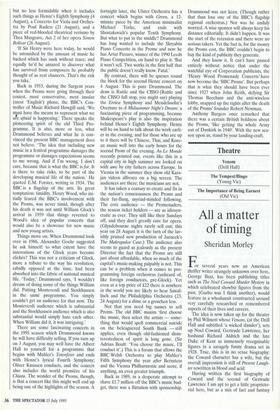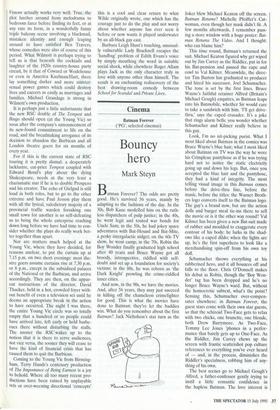Theatre Venom (Drill Hall) The Tempest/Bingo (Young Vic) The Importance
of Being Earnest (Old Vic) All a matter
of timing
Sheridan Morley
or several years now an American thriller writer strangely unknown over here, George Baxt, has been publishing titles such as The Noel Coward Murder Mystery in which celebrated showbiz figures from the past, (Garbo was I think another), would feature in a whodunnit constructed around very carefully researched or remembered aspects of their lives and careers.
The idea is now taken up for the theatre by Phil Wilmott whose Venom, (at the Drill Hall and subtitled 'a wicked slander'), sets up Noel Coward, Gertrude Lawrence, her husband Richard Aldrich and the late Duke of Kent as immensely recognisable figures in a savagely funny drama set in 1928. True, this is in no sense biography: the Coward character has a wife, but the overall impression is still of Present Laugh- ter rewritten in blood and acid.
Having written the first biography of Coward and the second of Gertrude Lawrence I am apt to get a little proprieto- rial here, but as a mix of fact and fantasy Venom actually works very well. True, the plot lurches around from melodrama to bedroom farce before finding its feet, or at any rate its form, in a wonderfully funny triple balcony scene involving a blackmail, mistaken identity and enough leaping around to have satisfied Ben Travers, whose comedies were also of course of this period. What Wilmott is perhaps trying to tell us is that beneath the cocktails and laughter of the 1920s country-house party circuit, be it that of Coward or Wodehouse or even in America Kaufman/Hart, there lay something darker and more sinister: sexual power games which could destroy lives and careers as easily as marriages and families. Michael Grandage is strong in Wilmott's own production.
It is perhaps just a little unfortunate that the new RSC double of The Tempest and Bingo should open (at the Young Vic) so soon after the company's announcement of its new-found commitment to life on the road, and the breathtaking arrogance of its decision to abandon the Barbican and all London theatre goers for six months of every year.
For if this is the current state of RSC touring it is pretty dismal: a desperately lacklustre, cut-price Tempest coupled with Edward Bond's play about the dying Shakespeare, needs at the very least a charismatic star if he is to double Prospero and his creator. The echo of Gielgud is still loud in both roles, but to go to the other extreme and have Paul Jesson play them with all the lyrical, valedictory majesty of a provincial traffic warden forsaking one small town for another is so self-defeating as to bring the whole enterprise crashing down long before we have had time to con- sider whether the plays do really work bet- ter together than apart.
Nor are matters much helped at the Young Vic, where they have decided, for reasons unclear, to put the curtain up at 7.15 p.m. on two short evenings: most the- atre goers assume curtains rise at 7.30 p.m. or 8 p.m., except in the subsidised palaces of the National or the Barbican, and arrive accordingly. They are then, on the appar- ent instructions of the director, David Thacker, held in a hot, crowded foyer with- out benefit of even a television set until he deems an appropriate break in the action to have occurred. The night I was there, the entire Young Vic circle was so totally empty that a hundred or so people could have arrived late, left early or held barbe- cues there without disturbing the stalls. The sooner the RSC wakes up to the notion that it is there to serve audiences, not vice versa, the sooner they will cease to have the kind of financial crisis that has caused them to quit the Barbican.
Coming to the Young Vic from Birming- ham, Terry Hands's centenary production of The Importance of Being Earnest is a joy to behold. Where all too many recent pro- ductions have been ruined by unplayable sets or over-weening directional 'concepts' this is a cool and clear return to what Wilde originally wrote, one which has the courage just to do the play and not worry about whether anyone has ever seen it before or now wants it played underwater by an all-black gay cast.
Barbara Leigh Hunt's touching, unusual- ly vulnerable Lady Bracknell escapes the 'handbag' problem of Edith Evans's voice by simply mouthing the word in suitable social shock, while elsewhere Roger Allam plays Jack as the only character truly in love with anyone other than himself. The result is an enchanting rediscovery of the best drawing-room comedy between School for Scandal and Private Lives.



















































 Previous page
Previous page